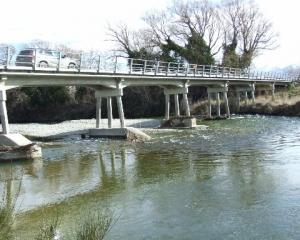Water and funding of irrigation schemes has been a contentious issue throughout Otago of late, specifically whether or not the Otago Regional and Central Otago District councils should support the Tarras Irrigation Scheme.
The scheme is intended to benefit 40 families in the Tarras district and while there is no doubt it could, the questions is whether or not it will.
Tarras Water Limited has 41 shareholders.
The Otago Daily Times contacted 15 families and farmers in Tarras, 12 of whom were shareholders in the Tarras scheme.
Most said they thought there would not be 40 people continuing with the scheme.
Some were still undecided whether they would continue with the scheme themselves and said they initially bought shares in order to fund and advance the feasibility study.
Others have considered the likely costings and believe they have no choice but to stick with current irrigation arrangements as the Tarras scheme would be way too unaffordable.
In order to buy into the Tarras scheme, people need to buy shares in the company at a cost of almost $2000 for each hectare they intend to irrigate, build on-farm infrastructure, and then pay $900 a hectare a year for their water.
One farmer, who did not want to be named, said he pays $8000 a year for water under the Lindis irrigation scheme. Under the Tarras scheme he would pay $170,000 per year for water, buy shares worth $900,000 and then face a cost of ''tens of thousands of dollars'' in on-farm development such as centre pivots - something he just could not afford.
One farmer spoken to, Robert Gibson, was ''100%'' in favour of the scheme and said he had sold off a block of land to fund his buy in.
Another farmer, Beau Trevathan, said while he was on board with the scheme, some aspects of it were ''ridiculous to the extreme'' and it should not proceed as proposed.
The water right for the Lindis scheme, which many farmers use, is set to expire in 2021 but even before that, new minimum flows could be imposed, meaning less water available for irrigation.
When the Otago Regional Council hearings panel heard from submitters on its proposal to amend its long-term plan to allow investment in the Tarras scheme in Cromwell recently, John Morrison made a submission on behalf of Lindis Irrigation Limited, which had previously been neutral on the issue. He said the company had commissioned an independent report into the future of the Lindis scheme which showed that if the proposed minimum flow of 450 litres/sec for the Lindis River was imposed (as proposed if the Tarras scheme did not proceed) then there would not be enough water to supply Lindis shareholders and the company would have to choose which of its shareholders got water and which went dry. In light of that, the Lindis company changed its stance and agreed the council should support the Tarras scheme.
The farmer who wished not to be named said because the Lindis company was a co-operative, the water would still be shared, there would just be less for everybody.
When presented with the report, shareholders of the Lindis company did not vote or discuss whether they should change their submission.
Mr Morrison said he was told what to say to the council by the directors of the company: Peter and Bruce Jolly, who are also directors of the Tarras company, Mr Gibson, who has the second-highest shareholding in the Tarras company, Beau Trevathan, Alistair Madill and Alistair Rutherford.
Of them, only Mr Rutherford has no shares in the Tarras scheme.
Mr Morrison is secretary for both companies.
The regional council will meet on Wednesday and consider supporting the scheme.
Scheme summary
• Estimated cost $39.2 million.
• Land irrigated would be just under 6000ha.
• Water take 4500 litres a second from Clutha River, between September and April only.
• Maximum take 73.6 million cu m.
• Need a 70% uptake in ordinary shares with attached water rights.
• Otago Regional Council asked to buy the remaining 30% as dry equity, expected to be repaid as more farmers pick up those shares as the project progresses.
• Rest of cost to be funded by bank loan; Central Otago District Council agreed in principle to act as guarantor for 20% of loan.


